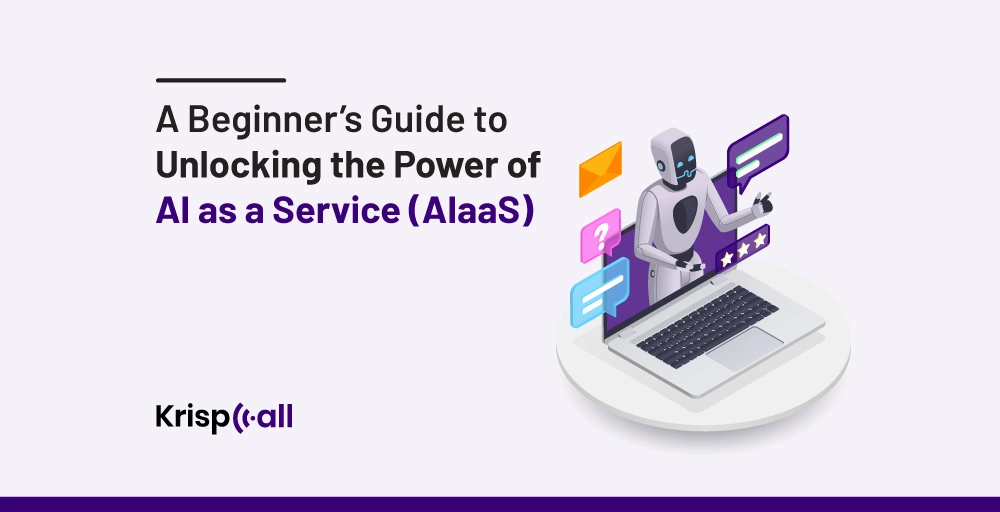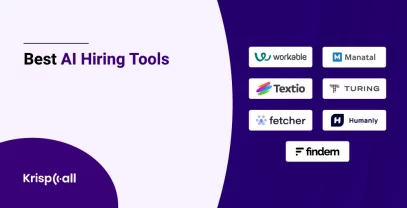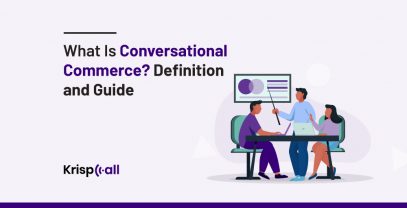In the era of fast technological advancements, business owners or entrepreneurs are feeling overwhelmed by the rapid advancements in technology and unsure how to harness the power of AI services.
Many businesses struggle to integrate AI into their operations because of high costs, lack of experience, and complexity of the deployment process.
Artificial Intelligence as a Service (AIaaS) has emerged as a game changer, offering sophisticated AI capabilities at an affordable price without requiring large upfront expenditures.
The report stated that 77% of companies are either using or exploring the use of AI in their businesses, and 83% of companies claim that AI is a top priority in their business plans.
In this blog, you’ll learn a complete beginner’s guide to unlocking the power of AI as a service, including what AIaaS is, its types and use cases, the top 5 AI service providers, benefits and challenges of AIaaS, and future trends and predictions in AIaaS.
🔥 Key Summary
- Artificial Intelligence as a Service (AIaaS) is a cloud-based service that allows businesses to access and use advanced AI technologies without requiring considerable upfront hardware or knowledge.
- Bot and digital assistants, machine learning frameworks, application programming interfaces, and data science and analytics services are the major types of AIaaS.
- Google Cloud AI is an AI service provider that offers a comprehensive set of advanced AI tools to help businesses rapidly construct, train, and deploy machine learning models.
- Microsoft Azure AI provides a full set of AI services known as Azure Cognitive Services. These services provide vision, speech, and search functionality.
- The democratization of AI, industry-specific solutions, increased adoption of generative AI, and integrated AI platforms are the future trends and predictions of AI services.
What is artificial intelligence as a service (AIaaS)?
Artificial intelligence as a service (AIaaS) is a cloud-based model that allows enterprises to incorporate AI features into their operations without having to accumulate any in-house expertise or infrastructure. This allows businesses to improve their operations through intelligent automation, data analysis, and personalized customer experiences, all while reducing costs and accelerating development times.
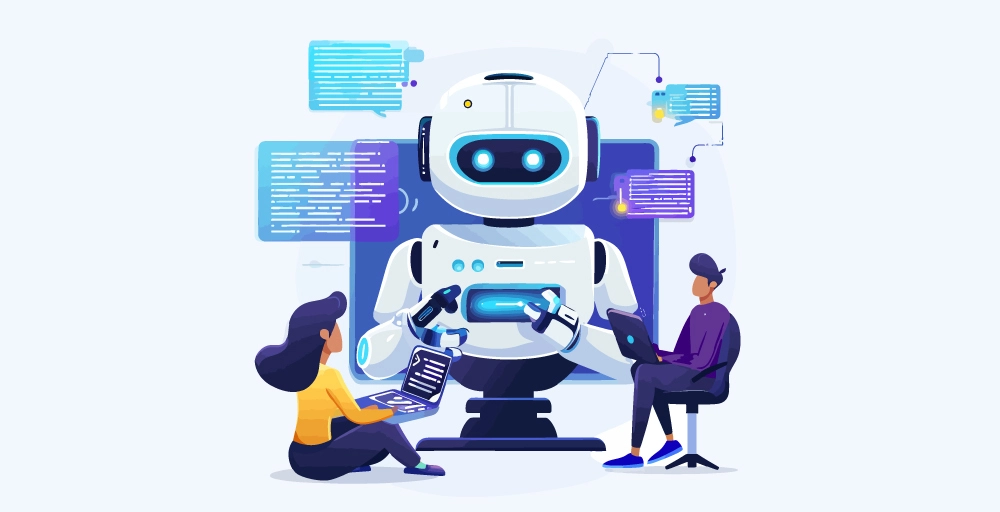
This concept promotes access to advanced AI technology, allowing even small businesses to harness the power of AI without making major upfront investments. It promotes AI by making it available to a wide range of customers, regardless of their technical expertise or budget.
For example, businesses can integrate AI-powered chatbots into their websites or apps, allowing them to handle common customer requests, provide instant replies, and escalate more difficult issues to human agents as needed. This increases customer service efficiency and availability without the need for the company to create or manage the AI technology itself.
Types of AI as a Service and Use Cases
Various types of artificial intelligence as a service are available, each delivering different functionality to meet specific business needs. Here are some key major types of AIaaS:
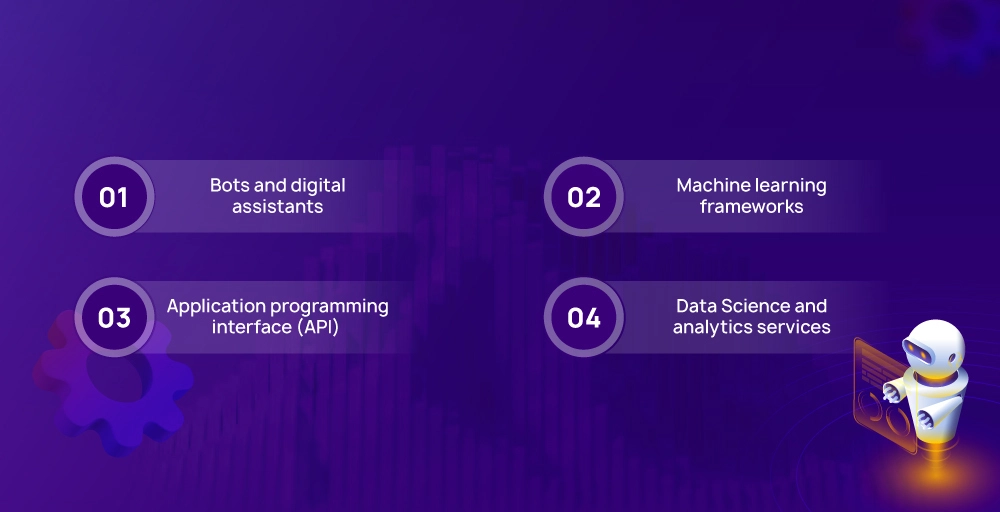
1. Bot and digital assistants
Bot and digital assistants are AI-powered tools that interact with customers via text or voice to assist and complete tasks. They understand commands and respond appropriately using Natural Language Processing. They improve with each interaction, delivering a more natural, personalized experience over time. Siri, Alexa, and Google Assistant are a few examples of digital assistants that can create reminders, control smart devices, and provide answers.
Use Cases: Businesses can offer customer service through chatbots on their website, live chat platform, mobile app, and social media accounts. Additionally, internal teams can utilize service desk chatbots for IT support.
2. Machine learning frameworks
Machine Learning (ML) frameworks are cloud-based software tools that help developers create unique AI models. AIaas vendors provide pre-built ML frameworks, allowing businesses to easily train and implement AI models without the heavy spending costs of in-house development.
Use cases: They are used in a variety of applications like image recognition for identifying faces and objectives, natural language processing for creating chatbots and analyzing text, predictive analysis for forecasting financial and healthcare trends, recommendation systems for suggesting products or content, and anomaly detection for detecting fraud and security breaches.
3. Application programming interface (API)
It is a set of defined rules or protocols that enable various software applications to connect and interact with one another. It standardizes the process of requesting and sending data between systems, allowing developers to integrate third-party services, access functions, and build complicated applications more easily.
Use cases: It is used for a variety of purposes, including third-party services like payment gateways and social media platforms, retrieving real-time data like weather updates or stock prices, enabling application features like map services and geolocation, and allowing software components to communicate with complex systems.
4. Data Science and analytics services
Data science and analytics services include a variety of tools and platforms designed to assist businesses in collecting, processing, analyzing, and visualizing huge amounts of data. These services offer significant tools for gaining insights, identifying trends, and making data-driven decisions. They include features like data mining, statistical analysis, machine learning, and predictive modeling.
Use cases: They are used in various sectors. In finance, they identify fraud and optimize investments. In healthcare, they are used to do predictive diagnosis and personalized treatments. Marketing uses them for customer segmentation and targeted promotions, while retailers manage inventory and predict demands.
Top 5 Artificial Intelligence as a Service (AIaaS) vendors
Whether you’re in the planning stages or are well on your way to implementing AI, recognizing the major AI service providers can help you make strategic decisions. The five firms listed below are helping to shape the AIaaS model, but keep in mind that they are only one piece of the equation. AI is not a standalone solution; rather, it is a tool designed to augment the capabilities of your current team and systems, allowing your company to grow, develop, and thrive.
1. Google Cloud AI
Google Cloud AI offers a comprehensive set of advanced AI tools to help businesses rapidly construct, train, and deploy machine learning models. These technologies enable businesses to create, train, and deploy machine learning technologies without needing extensive AI expertise.
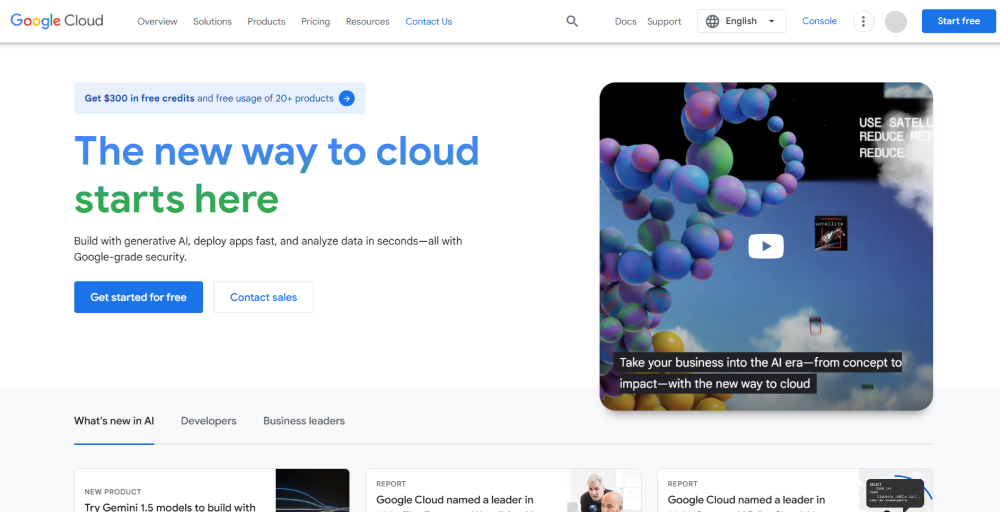
It provides pre-trained models for image, video, and text analysis, allowing businesses to easily incorporate advanced AI capabilities into their applications. This helps to decrease the complexity and time required for developing AI solutions, allowing businesses to focus on innovation and enhance core operations.
2. Open AI
Open AI simplifies workflows by offering strong, user-friendly AI models like GPT-3 and DALL-E via its API. These models are pre-trained on large datasets, allowing businesses to benefit from natural language processing and image-generating capabilities without the need for costly training or data preparation.

It is designed to be simple to integrate into multiple platforms, allowing developers to add AI features such as chatbots, content creation, and automated customer support with minimal support. This ease of integration and excellent performance of OpenAI’s models enable businesses to speed up AI adoption and streamline workflows.
3. Amazon Web Services
Amazon Web Services facilitates workflows by providing a diverse set of AI and machine learning services via its cloud platform. AWS provides businesses with tools and services for developing, deploying, and managing AI applications.
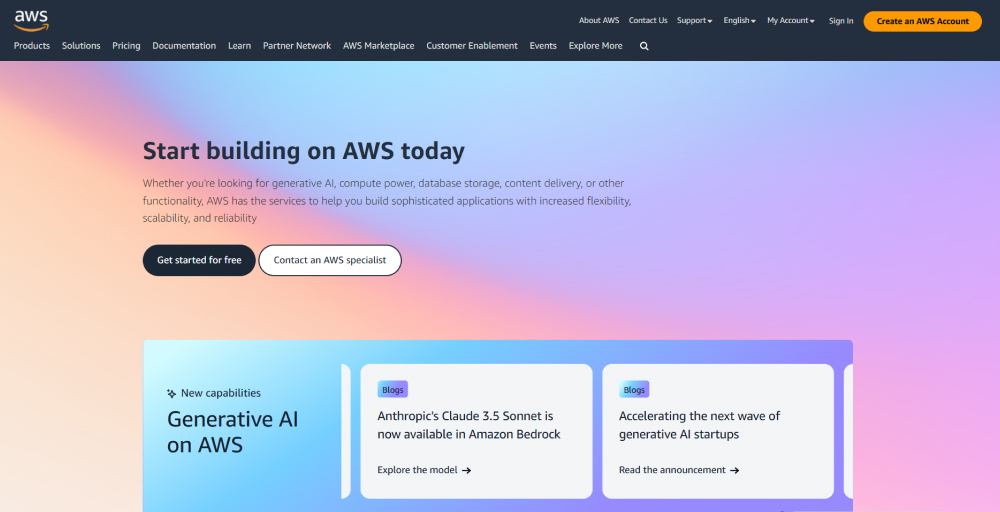
Businesses can easily implement AI-driven solutions with these services without requiring significant upfront investment or specialized knowledge since they are designed to integrate into existing workflows. By offering robust infrastructure and comprehensive support, AWS makes AI adoption more efficient and accessible.
4. IBM
IBM’s Watson platforms such as Watson Studio, Watson Assistant, and Watson Discovery help to simplify workflow. The IBM Watson platform empowers businesses with cognitive computing capabilities, enabling them to use applications, bots, and virtual agents to improve customer engagement and processes.

With these services, organizations can improve customer service, analyze data, and predict maintenance tasks as part of existing business processes. In addition to supporting and consulting businesses in AI adoption, IBM also provides ongoing optimization and support.
5. Microsoft Azure
Microsoft Azure AI provides a full set of AI services known as Azure Cognitive Services. These services provide vision, speech, and search functionality. Also, Azure machine learning allows users to easily design, deploy, and manage machine learning models.
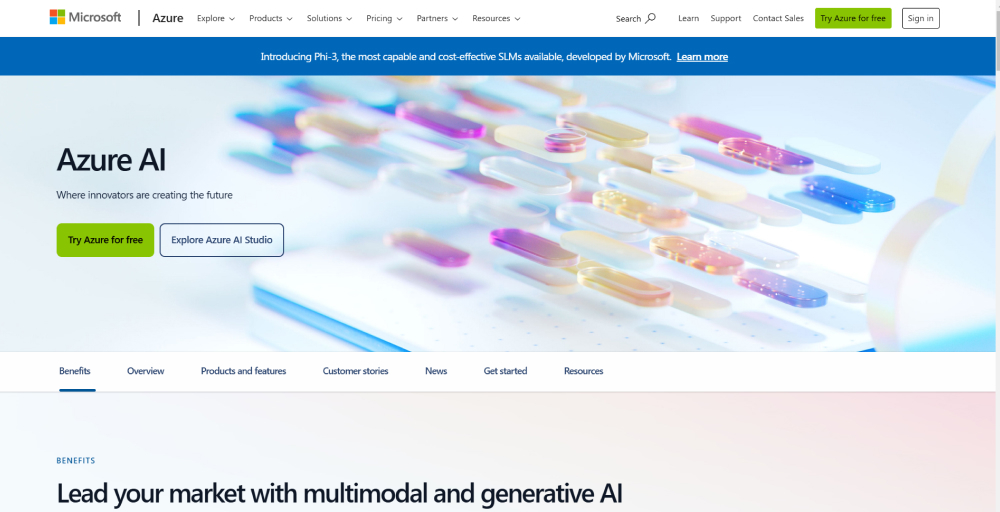
It includes tools for automated ML, drag-and-drop model development, and scalable training. Cognitive Services allows companies to integrate advanced AI capabilities into their applications quickly by providing pre-built APIs for vision, speech, language, and decision-making tasks. Chatbots created with Azure Bot Service can interact seamlessly with people across a variety of channels.
Benefits and Challenges of AI as a Service
AI as a Service, like any new technology or process used by a business, brings with it a unique set of benefits and challenges. Understanding both sides of the coin allows you to make informed judgments about how AIaaS should be integrated into your operations.
Benefits of AI as a Service
- Cost-effective: AIaaS avoids the need for large upfront expenditures in expensive hardware and software by providing AI capabilities via subscription. Businesses can use a pay-as-you-go model to gain access to cutting-edge AI tools and technologies rather than purchasing and maintaining costly infrastructure.
- Faster time to market: AIaaS provides pre-trained models and simple tools that allow organizations to avoid the complicated and time-consuming tasks of creating and training models from scratch.
- Scalability: AIaaS services are very scalable. Businesses may quickly scale their AI usage up or down based on their requirements, eliminating the need to invest in new hardware or manpower.
- Ease of use: Many AIaaS systems are designed to be user-friendly, even for users with limited technical knowledge. No-code or low-code platforms include drag-and-drop interfaces and pre-built models that may be changed without coding experience.
- Improved customer experience: AIaaS delivers 24-hour support, automates regular operations, and gives insights via sentiment analysis and personalized recommendations. These capabilities simplify client interactions, shorten response times, and increase satisfaction, allowing organizations to provide high-quality service while managing resources efficiently.
Challenges of AI as a Service
- Data security and privacy concerns: AIaaS includes sharing data with third-party providers, which raises privacy and security risks. Failure to protect data can lead to legal penalties, financial losses, and reputational harm. Hence, businesses must ensure that AIaaS providers have strong security measures to prevent data breaches and comply with legislation like GDPR and CCPA.
- Lack of in-house expertise: Without in-house expertise, businesses may struggle to select the right tools, integrate solutions, and analyze outcomes, limiting their capacity to leverage AIaaS. Investing in AI training or hiring a knowledgeable person is critical for maximizing AIaaS benefits.
- Integration complexities: Integrating AIaaS technologies with existing systems and workflows can be difficult and expensive. Addressing compatibility difficulties, data integration, and workflow improvements often requires a significant amount of time.
Future trends and predictions in AI as a service
As AI as a Service continues to evolve, lots of future trends and predictions are shaping the future of AIaaS. Some of the future trends and predictions in AI as a service are:
1. The democratization of AI
The democratization of AI is expected to shape the future of AI via a number of transformational themes. There will be broad adoption of No-code and Low-code platforms making it easier for individuals and businesses without extensive technical expertise to build and deploy AI solutions.
Industry-specific AI as a service will develop, giving more personalized tools and pre-built models for a variety of industries, while the expansion of AI education and training resources will assist bridge of knowledge gap for a broader audience. This means that even tiny organizations can use AI to analyze data, improve consumer experiences, and optimize operations. It’s a game changer because it leveled the playing field, allowing smaller enterprises to compete with larger ones.
2. Industry-specific solutions
Industry-specific solutions will be an important trend in the future of AI as a Service, with providers creating customized AI tools for industries such as healthcare, finance, retail, and many more. These solutions will include pre-built models and tailored capabilities to handle specific business concerns like predictive analysis for financial forecasts or diagnostics tools for healthcare.
3. Increased adoption of generative AI
Generative AI models like GPT-4 and beyond are projected to become more common in AIaaS solutions. These models will improve skills in content production, automated design, and creative jobs enabling organizations to produce high-quality text, graphics, and video with minimal human input.
4. Integrated AI platforms
In the future, AIaaS will provide a unified environment with AI tools for development, deployment, and management. These platforms will streamline the workflows by combining all necessary AI capabilities in one location, allowing businesses to streamline procedures, decrease complexity, and accelerate their AI initiatives.
Balancing AI with human touch
In contrast to replacing human connection, artificial intelligence aims to enhance it. While AI can analyze data, automate routine tasks, and deliver rapid responses, the human element is essential for empathy, creativity, and complex decision-making.
Using artificial intelligence services to supplement rather than replace human abilities is effective integration, such as utilizing AI for data-driven insights that feed human-led strategic decisions, or using chatbots to handle simple questions, leaving complicated or sensitive topics to human agents.
The role of Artificial Intelligence as a Service in modern business
As a flexible, scalable, and cost-effective solution, AIaaS provides organizations of all sizes with access to cutting-edge AI technologies. Advanced analytics, machine learning, and a variety of other AI capabilities are being democratized, making them available to more people than ever before. By eliminating the barriers of expensive initial investment and specialized knowledge, AIaaS promotes itself as a convenient and versatile ally for enterprises.
AIaaS enables businesses to use AI to make data-driven decisions, increase operational efficiency, and automate repetitive processes. It also enables individualized customer experience via advanced analytics and recommendation systems. Overall, AIaaS enables enterprises of all sizes to innovate, remain competitive, and grow in a continuously changing market.
Wrapping Up!
AI as a Service provides an unparalleled opportunity for organizations of all sizes to leverage the power of artificial intelligence without requiring large resources or specialized knowledge.
By making AI solutions accessible, scalable, and cost-effective, AIaaS enables businesses to innovate, streamline operations, and obtain important insights from their data. As you embark on your AIaaS journey, keep in mind that knowing your individual goals and employing the correct technologies to enhance your existing capabilities will be critical to success.
With the correct approach, AIaaS can deliver considerable growth, efficiency, and competitive advantage, preparing your company for long-term success in an increasingly digital world.

